Myles Kennedy talks Slash and World On Fire
Vocalist on recording, writing and guitar heroes
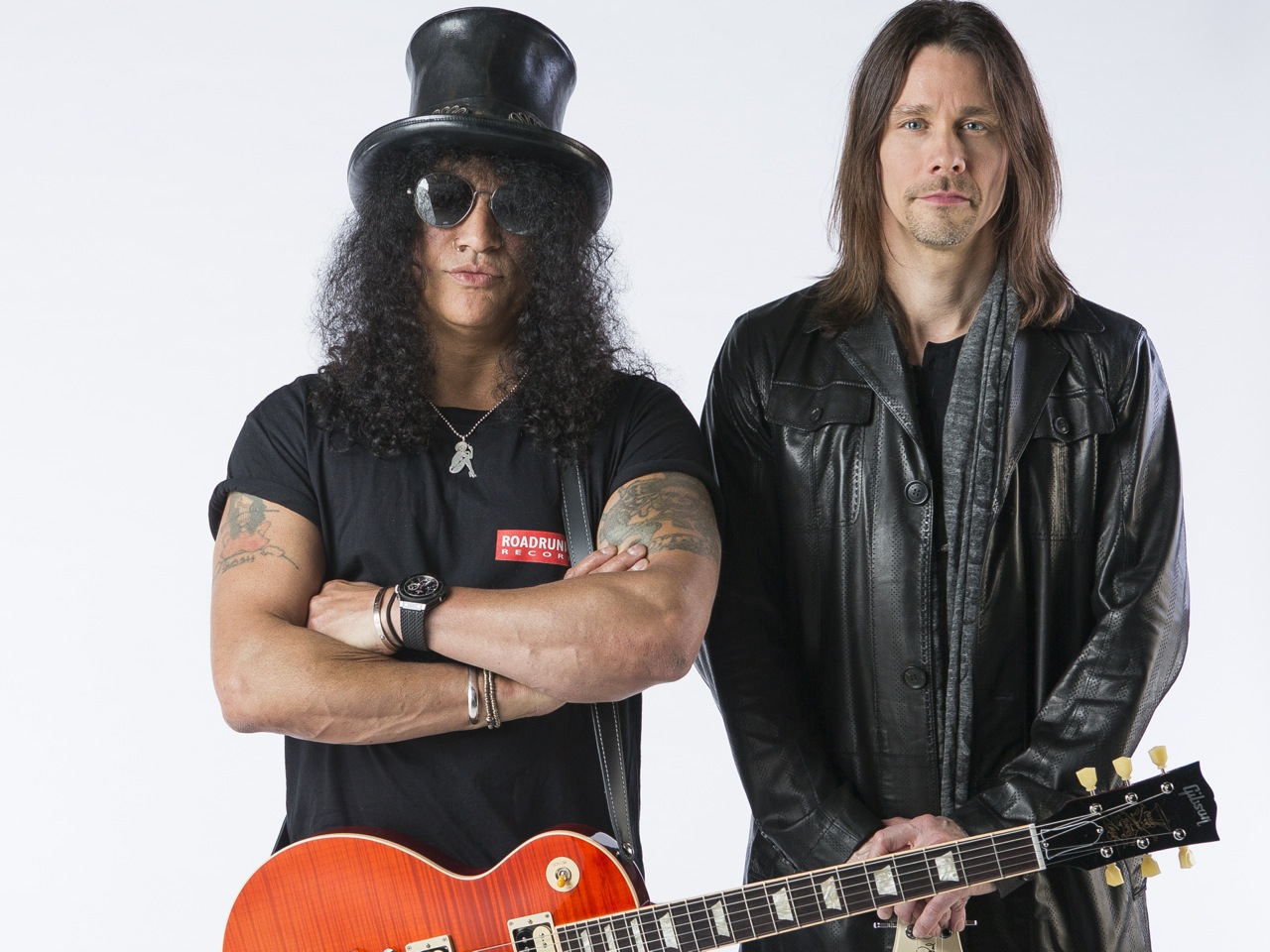
Myles Kennedy talks Slash and World On Fire
Myles Kennedy's remarkable voice has singled him out as one of heavy rock's premier contemporary singers, And, as anyone familiar with his other band knows, his guitar and songwriting chops create a triumvirate of talents.
Between Slash and Alter Bridge commitments, Myles rarely leaves the road for longer than a couple of weeks (he's had a solo album nearly done for years but no time to finish it), so we'd allow him a little bit of an ego. However, there is none; this is a man driven by his musical itch, not the trappings of fame.
We sat down with the Nicest Guy In Rock to talk about the making of the new album with Slash and The Conspirators, World On Fire, as well as his thoughts on the future of rock 'n' roll and guitar heroes.
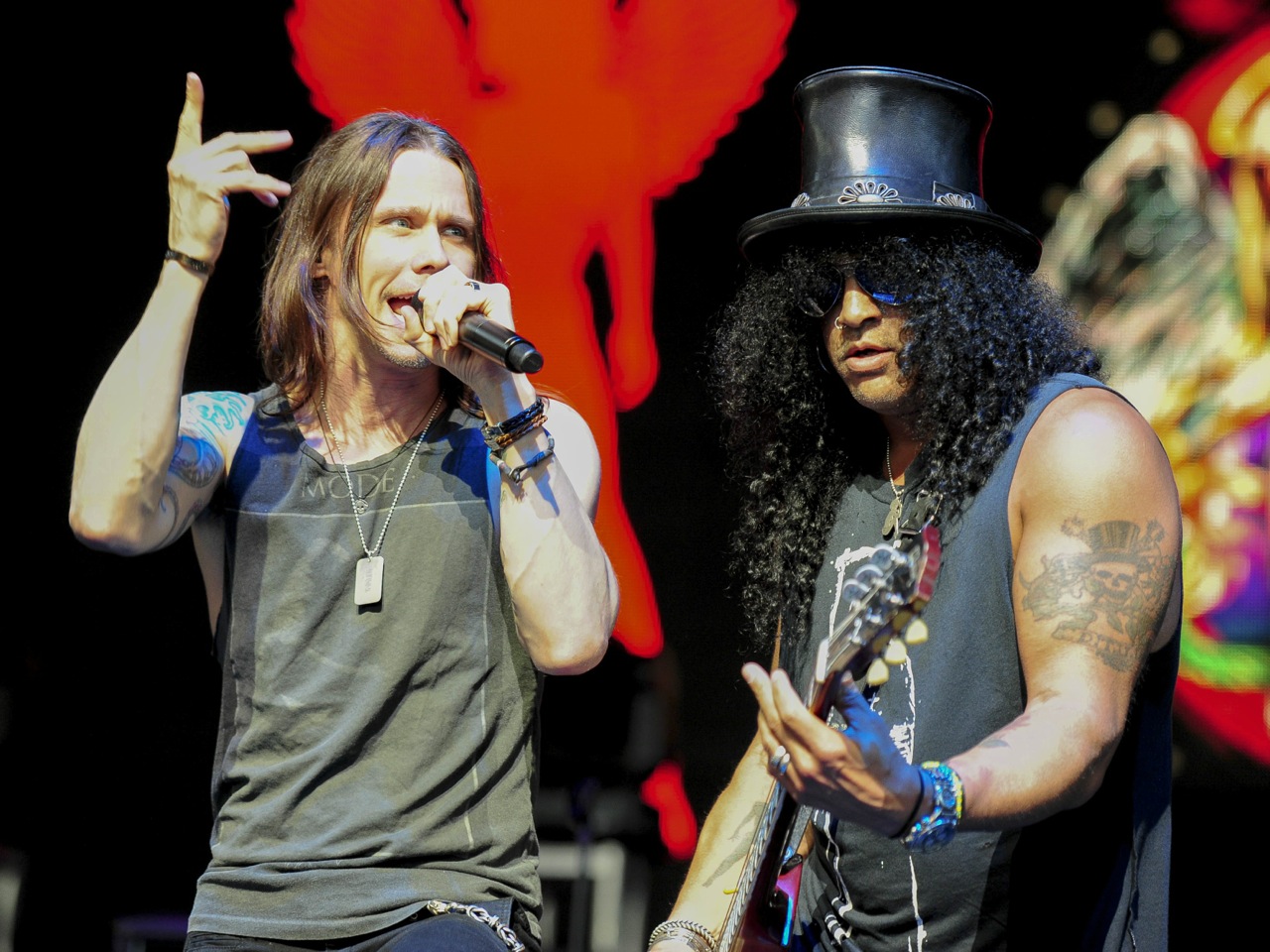
Working with Slash
You seem to work continuously between Slash and Alter Bridge; are you staying sane?
“So far. At first, about four or five years ago, when this started, as far as the frequency in which I’m touring goes it was kind of hard to get used to. Last night, I was sitting with Mark [Tremonti] and he was like, ‘We’ve been out for four or five weeks, I don’t know how you can go back out on the road for another run.’ You kind of get used to it. It becomes your existence; what you know. It’s almost like you train your body to operate that way. It’s like a muscle, I guess, the more you use it, the better it gets.”
There are 17 tracks on this album; writer’s block still doesn’t seem to be a problem for you, even with two bands on the go...
“Not yet. The well still seems to be there to draw from. I can’t tell whether that’s always going to be the case, just because a lot of times you see that writers do have a finite amount of ideas and concepts to draw from. I think what I’ve learned to do is not look inward as much.
It was almost like a journal, the way I used to write, especially back in the Mayfield Four days. As time has gone on I’ve had to look at the world around me and had to tell stories, to a point.
"I’m certainly no Bruce Springsteen, in terms of being a storyteller, but I’m trying to get a better handle on it and not always go after it from an autobiographical standpoint.”
Was this an easier album to make for you than Apocalyptic Love?
“With this one it seemed even faster. That could just be because we've all been doing this for so long. I mentioned the same thing on the last Alter Bridge record; the process has changed so much where there's not so much overthinking, at least not so much on my end. It's definitely about trying to stay in that stream of consciousness and not overthink.”
Slash describes your musical chemistry as instantaneous, did you feel the same?
“Yes, I think that's what drew me to this whole thing – the ease of it. When he first sent me the music for what became the song Starlight [from Slash's 2010 self-titled solo album] it happened very naturally. And for the most part it's been that way ever since.
"I think a lot of it has to do with the fact that we're both very blues orientated artists; we draw from a certain amount of soul in the way we approach things. And I think that's where our chemistry really lies; the need to emote.”
And you don't argue?
“No, in fact I don't think we've ever really had an argument. There have certainly been times when there might be a part or a lyric or an idea where it's a case of, 'I'm not sure about that' or 'I'm not coming up with something for this, I'm not reacting to it' and the cool thing about that is that we've both been in this dog and pony show long enough to know that's going to happen.
"You just don't take it personally, it's part of the filtration process and part of why I want to work with this person and collaborate with them, because I trust their instincts.”
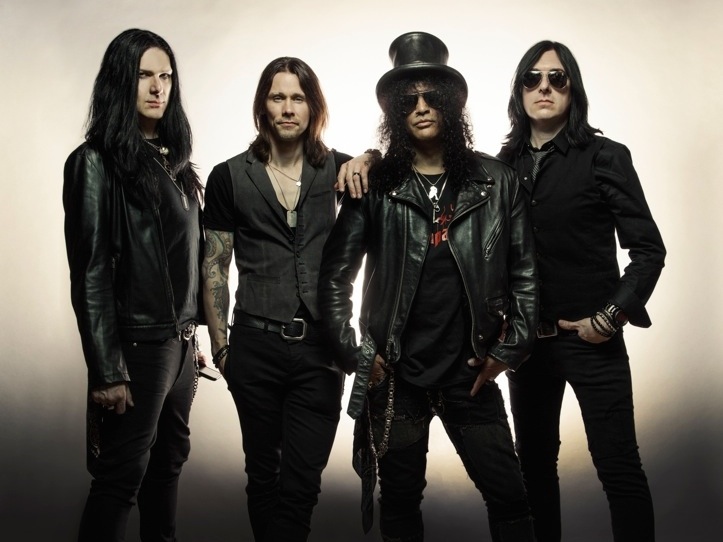
The creative process
The creative process changed for this album with Slash working with Conspirators bassist Todd Kerns and drummer Brent Fitz on demos – was it more inspiring for you to hear the songs in a more organic way, and with that live energy?
“Yes, it felt more complete, so I had more to play off of melodically. That's not to say that some of the stuff he sent from the Apocalyptic sessions wasn't. The demos were varied on those sessions but with World On Fire, when I'd get a demo there was an entire rhythm section with Slash playing and it certainly gave me more of a vibe. And it changed even more once we got in with Elvis. It was a good process overall and I think that's one of the reasons it moved as quickly as it did.”
Have you bonded as a band now?
“Yes, I felt that way at the end of the Apocalyptic Love run. We’d played enough together, and there was definitely a thing that had evolved. Brent and Todd are really amazing musicians; Brent can play a number of instruments extremely well, Todd is an incredible talent. He can sing as well as he can play bass. It’s become a well-oiled machine, and everyone is very grateful. We’re rolling with it.”
Did Slash still send you snippets of his ideas when you were out touring with Alter Bridge? Things he was excited about?
“Yes, in fact there was quite a bit of that initially. Generally it was right from his phone memo. He would send it to me – just him and an acoustic guitar – and I would put a melody to it and send it back to him. There were a fair amount of those. Then there were song that were completely arranged, and he'd send those with the rhythm section on and I'd put them melody on after the fact so it depended.”
What were the songs that you contributed chord progressions to?
There's a song called Battleground and at the very end there's a big singalong outro. Strangely enough, when he first sent Battleground I was having a tough time coming up… not a real tough time but wondering if those melody could be a little different when we get to the chorus. I remember stopping it and then playing that chord progression in my hotel room [sings outro melody] and just holding on to that.
"So when we got in the rehearsal studio and we're running through it, I pulled that out and asked everybody if they thought that would be a cool section somewhere. And it became the outro. And it's probably one of my favourite moments from Slash as far as the solo. So when I hear him solo over that chord progression, it's definitely got a really great vibe.
"Slash has got these lines that are so unorthodox and just make you realise what a gift he has as a solo artist. I love hearing him play over that three chord progression.”
Do you ever get to jam with him on guitar much?
Myles: “Not very much but we did in the studio, that was fun actually. We just started playing some blues unplugged and that was a blast.”
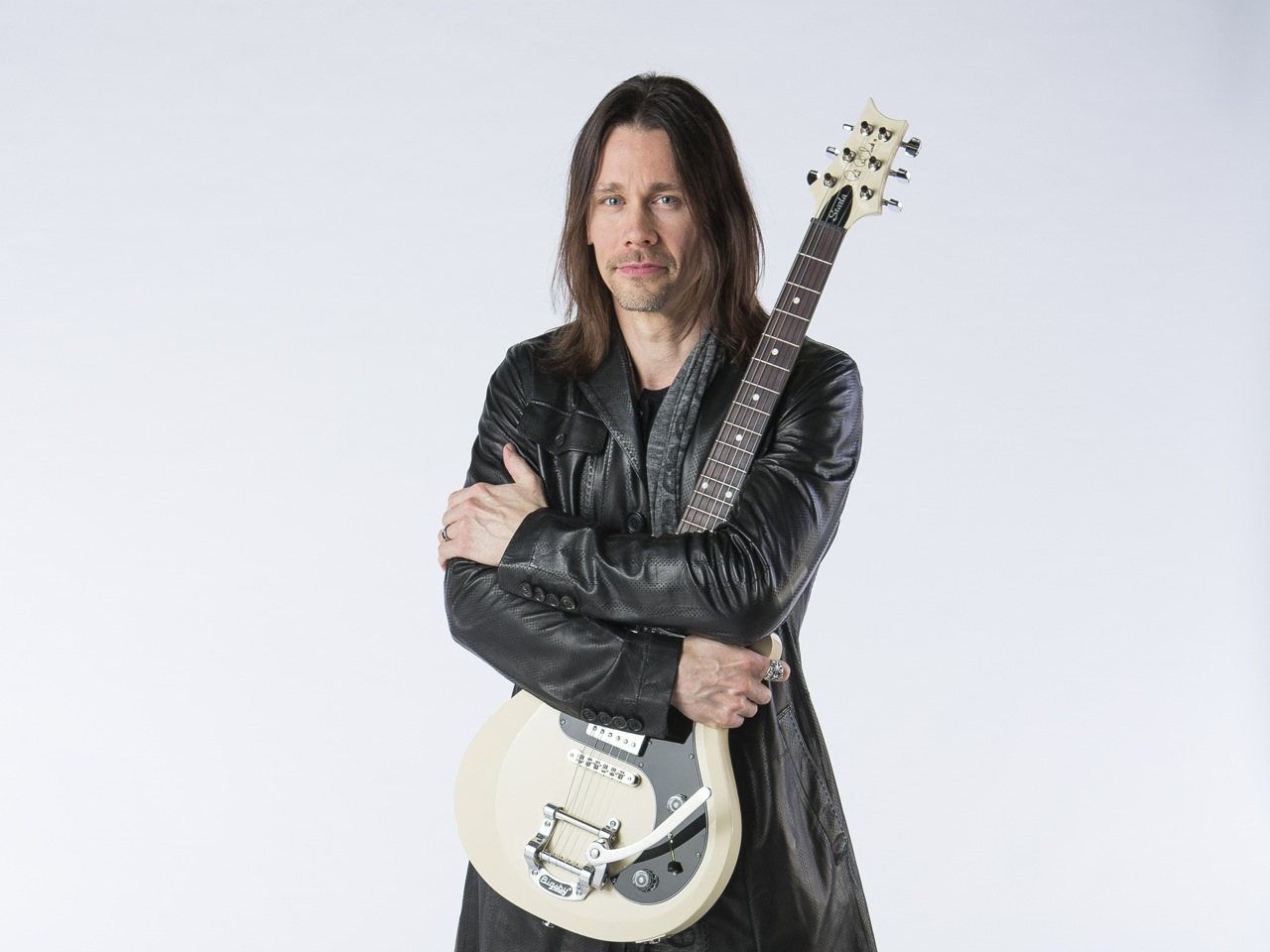
Guitar and recording
It feels like there's a real synergy between your voice and Slash’s guitar on songs like Automatic Overdrive, 30 Years To Life and The Dissident…
“Some of the songs you listed off there were some of the easiest ones to put together from a melodic standpoint. Like Automatic Overdrive – that came very quickly. It just felt very natural. It wasn't something that was overthought, at least on my end.
"30 Years To Life is something that came real quick, at least melodically. Lyrically it was a different story; it was a real pain in the ass! That's the beauty of this team, it's pretty painless. And I think that makes for a better record.”
Were there any songs that changed quite dramatically in the studio?
“30 Years To Life definitely had some changes – the intro wasn't there, which turned out to be one of my favourite parts actually. A big singalong which almost has an Oh Brother Where Art Thou vibe to it. That part didn't exist before.
"When I came back after they put the arrangement together, Elvis was like, 'Wouldn't it be cool if for this part here there was this group vocal, real bluesy Brother Where Art Thou thing.' So I was driving back to the hotel and it just popped in my head and I pulled over and sang it into my phone. We tried it the next day and it worked out great. That's going to be a fun one live. The crowd's going to sing that one back.”
Was it a relief for you not having to take on rhythm guitar duties in the studio for this album?
“Yes, especially as I’m bouncing back and forth between two projects. I’d just got off the road from the UK run with Alter Bridge when we started working these sessions late last year. It freed me lyrically. On the Apocalyptic sessions I was doing guitar in the afternoon and trying to make sure all those arrangements were tight on my end and I was able to track proficiently. And then I was trying to find time to fine tune lyrics that weren’t done.
"With this, Slash would be in during the day cutting guitars and I would be at the hotel finishing the lyrics. I’d come in at night and really feel confident and ready to go. It just made it a lot less
stressful for me.
“With that said, I miss playing guitar, because you know how much I love playing the guitar. But I think it’s worked out real well for this record. I’m glad we did it this way. This record was the first since the first Alter Bridge record where I was really just focusing on vocals exclusively. And I think it turned out great for me as a vocalist because it allowed so much more time, instead of wearing two hats. I still love playing guitar more than anything, though.”
Does it balance out that you're guitar playing is becoming more prominent elsewhere? Alter Bridge Fortress featured more lead playing from you, and more people are realising that you're much more than a vocalist
“I think it helps that I have that outlet, that's a very valid point. In fact I was just thinking about that earlier today. I'm grateful that I have that outlet with Alter Bridge. I think that if I was just strictly the singer guy, I don't know how that would work in the long run because it's always been such a big part of my life, for most of my life. So to kick that to the curve would be kind of a tragedy for me as far as I'm concerned.”
You’ve worked with producer Michael 'Elvis' Baskette in your old band Mayfield Four, with Alter Bridge and now World On Fire; do you think he understands what fans want to hear from artists?
“I think so. Elvis said something to me once that really stuck with me, I'll get it wrong but it was something to the effect of, he can get good but his job is to get great. And to get what each artist is capable of and to realise their true potential.
"I think that's why Elvis so much as a producer. There are days when you've been in for 12 to 14 hours and you start to get burned out and think, we'll just track this and be done. He won't stand for that. His work ethic is out of control.
"That guy is just so driven and he won't let you slack. Because it's being documented forever. You don't want to settle because when you're gone this is part of your legacy. To know that there's someone at the helm who is going to make sure that is documented the best it's going to be is very important.”
Elvis and Slash are fans of analogue recording, but what's the appeal for you?
“Vocally I don't think analogue makes that much difference, but with guitars it definitely makes some difference. With drums and bass absolutely. It has to do with the compression you get when the signal hits the tape. In the digital world they're getting closer to copying that and it won't be long until you can pretty much simulate that.
"I think there's a psychology to it as well, and knowing that it's going to a medium that can't be manipulated helps to keep you on your toes. You're not just turning it into zeroes and ones that you can then move around and change. You're putting it to a format that once it's there, it's there, Sure, you can cut tape but it's different. You have to be on your toes.”
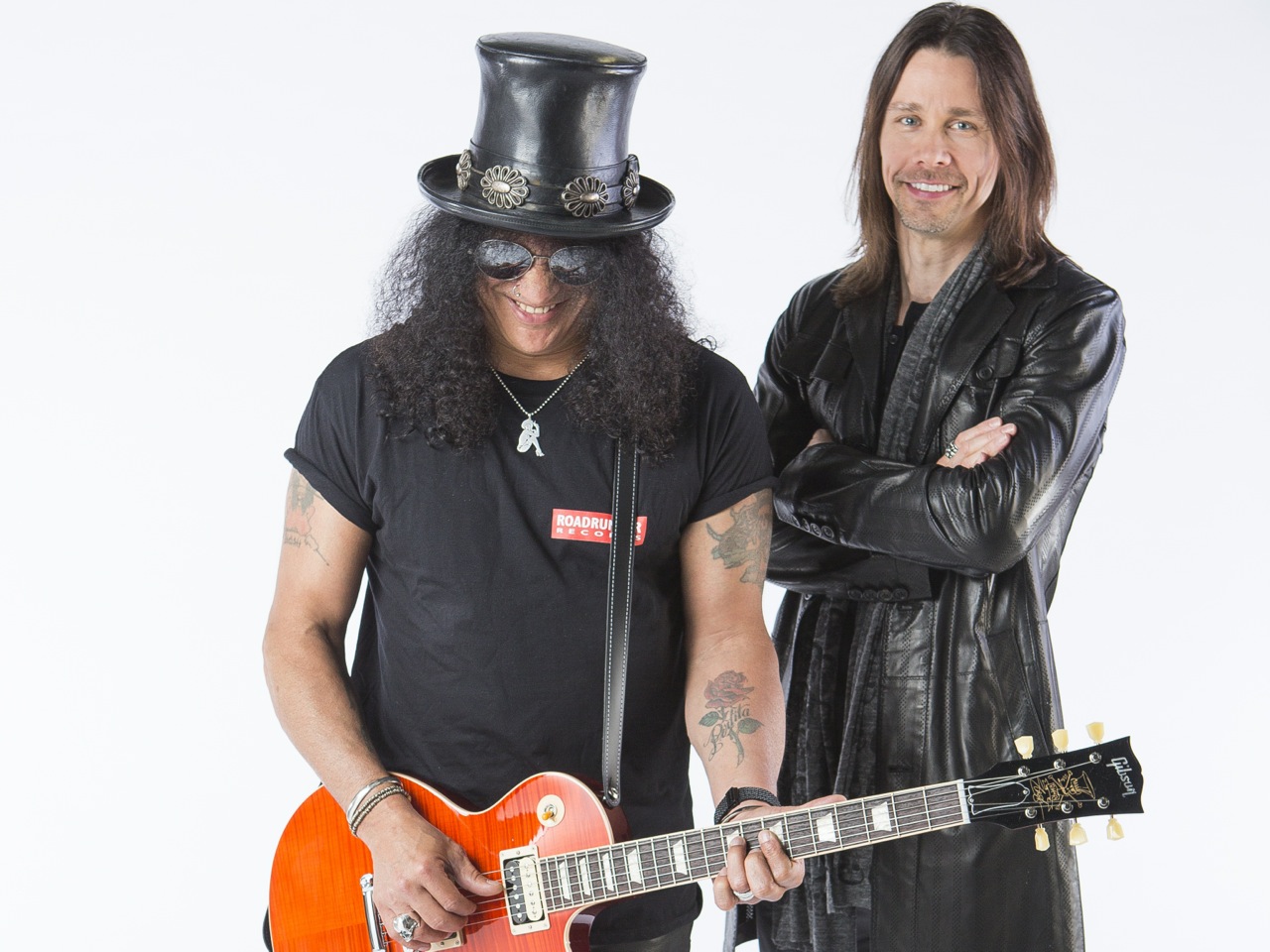
Rock 'n' roll and guitar heroes
Do you feel that Slash and the band are flying the flag for rock n' roll in the mainstream at a time when it's not the force that it once was?
“It's doing what we know and doing what we love. But I do agree that it doesn't seem as though there are as many straight up rock bands as there was 25 years ago. That's part of what I really enjoy about this record; it's got elements of that old school approach, but bridging it with something contemporary as well so it's not just a retro record.
"I think that we're really trying to uilise both worlds and make it our own. And there are a handful of bands that are doing straight up rock n' roll and doing it very well. Rival Sons definitely being one of those bands. And I just heard the new California Breed record too. They're definitely bands that are doing great rock n' roll, but at least to my ears it doesn't seem as though there are as many as there used to be. So there are a handful of us that are flying the flag.”
Do you think we'll ever see the mainstream insurgence of rock in the mainstream again, like we did in the nineties with grunge?
“It's kind of come about in the last decade, to a point. You've got the White Stripes, The Black Keys… there are elements of that, which is good. Jack White is brilliant. But it's not an actual movement like it was with grunge. Grunge was, to me, the last big movement. It had such an impact on pop culture. We haven't really seen anything like that since, and we may never again. Things have changed, the digital age has changed things.”
Slash is an undisputed guitar hero, but do you think the guitar hero is a dying breed – and is the nature of guitar heroes changing?
“Fifteen years ago I would have said yes. Grunge, in a lot of ways, kind of killed the guitar hero for a little while. Then I think in the last decade there are a handful of bands that are coming around with these kind of guitar players who are very proficient technically.
"We just did some shows with Avenged Sevenfold the other day and those guys can play – those guys are really tight guitar players. [Guitar heroes are] there; guitar is not dead. As long as there are people who want to hear music from musicians who have put the time and effort in and who are very dedicated to their craft, there will always be people who want to hear a guitar hero… hopefully. It's a very important part of rock music and hopefully that won't go away.”
It’s a busy time for you, but wider success has come later in your career than it does for many artists; can you appreciate the value of it more now than you would have earlier?
“Without a doubt. I think had it come 20 years earlier, I don’t know if I would have had realised how fortunate and lucky I am. Part of that is what drives me to keep doing it and working kind of non-stop. I know it’s not an easy place to get to and you can’t take it for granted. If I were younger, I might not have realised that. So I’m grateful it took a long time to climb the mountain.”
Slash featuring Myles Kennedy and The Conspirators tour the UK in November and December. For more information on dates visit SlashOnline.com

Rob is the Reviews Editor for GuitarWorld.com and MusicRadar guitars, so spends most of his waking hours (and beyond) thinking about and trying the latest gear while making sure our reviews team is giving you thorough and honest tests of it. He's worked for guitar mags and sites as a writer and editor for nearly 20 years but still winces at the thought of restringing anything with a Floyd Rose.

